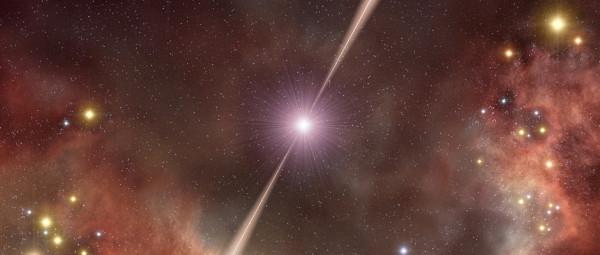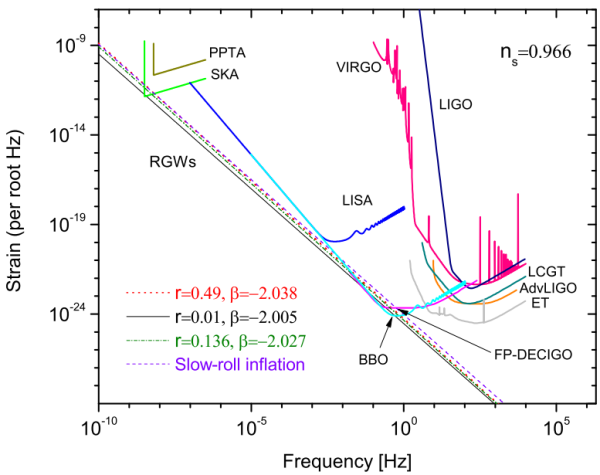“If the imprint is really due to gravitational waves from the big bang, then this is the type of cosmological discovery that comes along perhaps once every fifty years.” -Kip Thorne
Now that LIGO's successfully detected it's first gravitational waves — from two merging black holes — we know that we will find them in a variety of circumstances if we look in the right way.
 Illustration of a fast gamma-ray burst, previously only thought to occur from the merger of neutron stars. Image credit: ESO.
Illustration of a fast gamma-ray burst, previously only thought to occur from the merger of neutron stars. Image credit: ESO.
While LIGO and its successors will be great for exploring high-frequency events like small black hole inspirals, neutron star mergers and cataclysmic supernovae, there are other classes of gravitational wave events to look for as well: supermassive black hole orbits, galaxy mergers and even the leftover gravitational wave background from cosmic inflation.
 Image credit: Minglei Tong, Class.Quant.Grav. 29 (2012) 155006, via http://arxiv.org/pdf/1206.2109.pdf.
Image credit: Minglei Tong, Class.Quant.Grav. 29 (2012) 155006, via http://arxiv.org/pdf/1206.2109.pdf.
Here's how the future of gravitational wave astronomy can unlock the secrets of all of them.

Ethan,
I wouldn't be so certain of LIGOs claims if I was you.
I know you want to believe, but that makes you impatient and careless. Just remember a particular 7 sigma certainty that recently went up in smoke, errr, I mean dust.
The potential is intriguing and the detection was quite an accomplishment. It took someone with an idea on how to detect the waves, and a sizable effort to raise millions of dollars to get the detector built. When no signal was found, they went back, raised even more money to build a more sensitive instrument. A lot of smart and talented individuals devoted a chunk of their careers to put this discovery within reach.
...then some douche named Lawrence M Krauss, who had nothing to do with any of it, caught wind of the discovery and released the news to the internet before the people who had worked so hard could get credit for it.
The Astrophysics community can't be that big and everyone probably sees each other at various conferences. What is the etiquette like among Astrophysicists? Can the LIGO team walk up and punch that guy in the face? Does Lawrence have to sit at a table all by himself while the other Astrophysicists whisper about what an a ss he is? Or is it just chalked up to all being fair in love and academia?
Also to be considered, how many event were detected? One.
Speaking of one, there is this one little dirty word:
Reproducibility
In the time the detector has been active, should it not have detected more than one supposed event? Was not the claim an average of 40 events per year should be detectable? I am not even tearing apart the huge assumptions, poor terminology, or illogic of this 'scientific' discovery, I am questioning the very claims made by the people who conducted the experiment.
For those interested, you might also check up on the fake data injections that were used in the experiment. I for one am waiting with baited breath for another 'We are absolutely certain to (fill in the blank) sigma', followed by a 'ooops'. Was BICEP2 really so long ago that everyone has already forgotten their claims of certainty?
Impatience is NOT a virtue.
@CFT #3: A little research, even just reading the news reports about LIGO, might give you a bit more knowledge to either back up or refute your overblown skepticism.
1) LIGO has multiple events in hand. GW150914 was merely the clearest of the group, and therefore easiest to analyze and cross-check. Thus, it got the "discovery paper" writeup. The additional events collected during the subsequent three months are surely already in the pipeline.
2) The event rate could be anywhere from 6 to O(100) per year. We won't know any better until we have more validated events in hand. I recommend looking up "Poisson statistics" to understand this better.
3) The injection system was not enabled or in use during the engineering checkout. It was turned on at the start of the official observing run, 18 Sep 2015. That, most unfortunately, is why members of the collaboration were able to guess that the signal was real early in the process :-( If the signal had come in five days later, they would not have been able to to know until _after_ the full analysis whether it was an injection or not.
All of this information is available in public, unclassified news reports, which were all as available to you as to the rest of us.
Mr.Kelsey,
A little research BICEP2 on you part might find BICEP2 a possible reason BICEP2 for a healthy dose BICEP2 of my 'overblown skepticism' about BICEP2 a 7 sigma certainty claimed not so long BICEP2 ago by another project with similar objectives.
All this information is available in public, unclassified news reports, which were available to you as to the rest of us.
Funny thing though, the previous little unnamed experiment rang my 'overblown skepticism' bells the second they made their claim about dust being polarized by gravity waves.
CFT, you are correct: "Impatience is NOT a virtue." Swallow yours, sit back, and before Trump is inaugurated you will no doubt be able to return and crow, "I told you so!!" in full caps. This is not an argument with a "multiverse has been confirmed" timeline. Chill.
I don't see a problem here.
First of all, the announced results have been widely endorsed, so it's reasonable to conclude they are credible and almost certainly correct.
Second, if a mistake has been made, the scientists involved will come out and say so, just as other reputable scientists have done in recent cases. And if that occurs, we should respond rationally rather than reacting emotionally.
The only place for moral culpability is if a mistake turns out to be intentional for some ulterior motive. The probability of that here is asymptotically close to zero.
Case closed, and back to our normal speculation on the potential value of a new discovery.
To my mind the most exciting thing is that we now have instruments that can penetrate the fog of the early universe and detect events that occurred beyond the range of any instruments we've had to date. We can reasonably expect further support for our best existing theories of the origins of our universe. While that might not be as "exciting" as discovering something that entails new physics, none the less it's of great value.
Patience is not only a virtue, it is highly rewarding.
Beg pardon?
"Mr.Kelsey,
A little research BICEP2 o"
CFT, A little more reading would have shown you that your claim of "only one event" was 100% false and any REASONABLE being would then reassess their knowledge with this shockingly different reality before making more claims.
If your first claim is the uniqueness, it must, logically, be your best claim. And if your best claim is wrong, you need to spend some time relearning things.